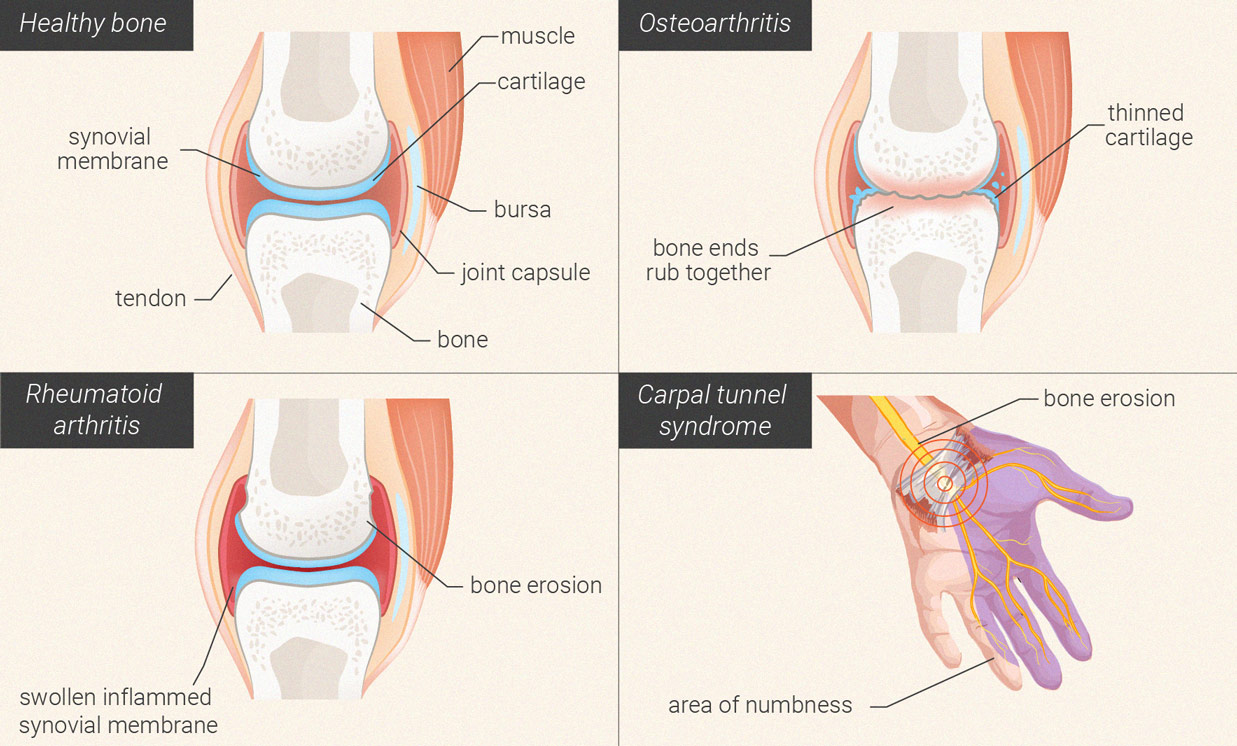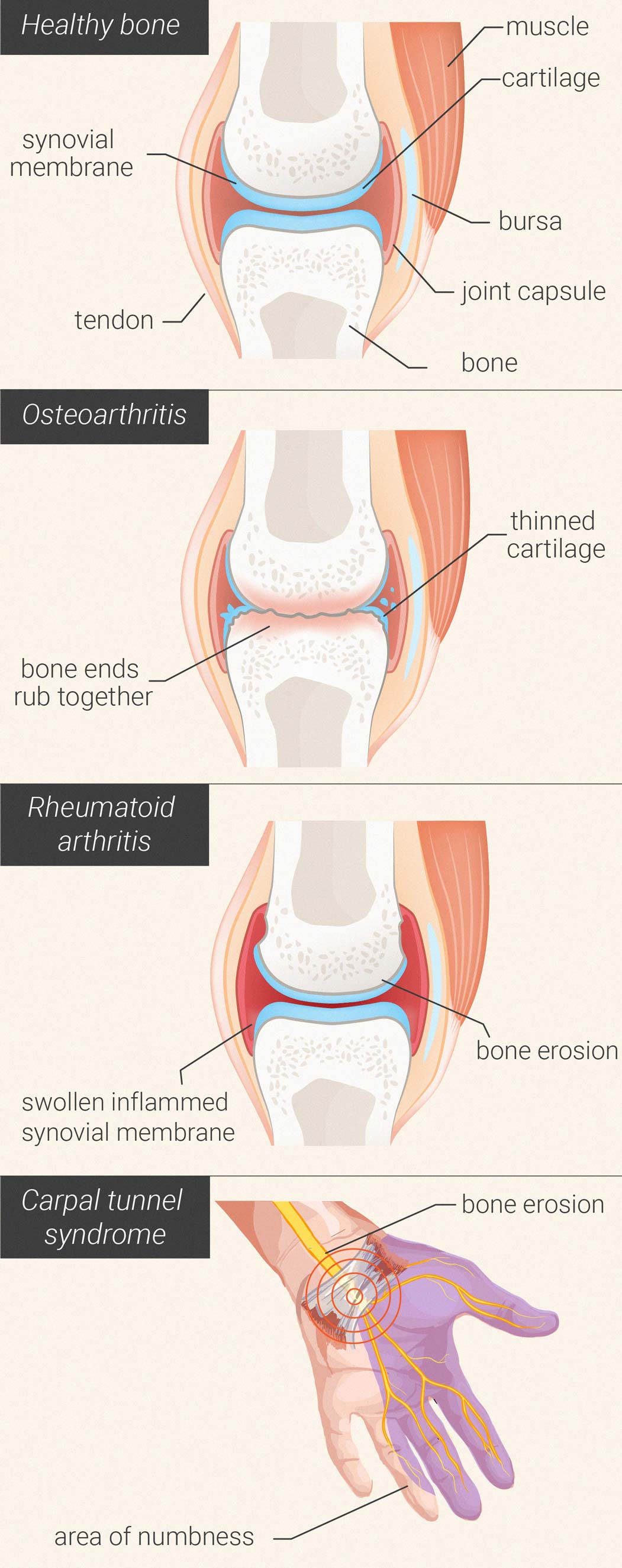
Can Cannabis Reduce Arthritis Pain and Inflammation?
Arthritis causes pain, stiffness, and discomfort. Fortunately, lifestyle interventions help many patients deal with their pain, improve their mood, and may even help slow down the disease's progression. However, in some patients, despite modern medications, the condition still persists. Researchers are now probing cannabis for its therapeutic potential.
Contents:
Although evidence-based medicine lacks a definitive cure for arthritis, several treatments help to slow down the disease's progression. Early treatment such as lifestyle interventions are particularly effective, but often not enough. So, where does cannabis fit into the treatment of the condition? We're going to take a closer look at arthritis, the different types, and how cannabinoids such as THC and CBD may help.
What Is Arthritis?
In a wide sense, arthritis—or technically, arthropathies—depicts a range of inflammatory and non-inflammatory conditions that involve the function and tenderness of one or more joints. Although primarily associated with the ageing process, even young people can experience some of these conditions. Check out these key facts[1] about arthritis to learn more about these diseases:
- It affects a lot of people: A staggering 54.4 million people in the United States have doctor-diagnosed arthritis, and it's estimated that over 40 million[2] people in Europe have osteoarthritis
- It affects women more than men: Arthritis occurs in women slightly more than in men, although experts aren't entirely sure why.
- Lack of physical activity may contribute to the condition: Some kinds of arthritis affect those that report no physical activity more than those that meet physical activity recommendations.
Arthritis has a massive impact on both the individual and society as a whole. So, it will come as no surprise that scientists are keen to find new ways to treat the condition, improve quality of life, and reduce the number of people affected. However, the difficulty in treatment stems from the various types of arthritis and symptoms.
Types of arthritis
Some of the most prevalent forms of the disease include:
| Osteoarthritis (or arthrosis) | Osteoarthritis (or arthrosis): Non-inflammatory—i.e. degenerative—gradual wearing down of joint cartilage and bone deformity. |
| Rheumatoid arthritis (RA) | An inflammatory disease in which the immune system attacks healthy cells in the joints and, eventually, other body parts./span> |
| Gout | Intense pain and swelling caused by the build-up of uric acid crystals in joints |
| Lupus | An autoimmune condition induced by unknown causes, which affects joints, skin, kidneys, and many other organs. |
| Psoriatic arthritis | A form of arthritis that affects people with the skin condition psoriasis |
| Carpal tunnel syndrome induced by arthritis | Arthritis and carpal tunnel syndrome are two different conditions. However, rheumatoid arthritis and arthrosis may increase the risk of an individual developing carpal tunnel syndrome. |
| Osteoarthritis (or arthrosis) | Osteoarthritis (or arthrosis): Non-inflammatory—i.e. degenerative—gradual wearing down of joint cartilage and bone deformity. |
| Rheumatoid arthritis (RA) | An inflammatory disease in which the immune system attacks healthy cells in the joints and, eventually, other body parts. |
| Gout | Intense pain and swelling caused by the build-up of uric acid crystals in joints |
| Lupus | An autoimmune condition induced by unknown causes, which affects joints, skin, kidneys, and many other organs. |
| Psoriatic arthritis | A form of arthritis that affects people with the skin condition psoriasis |
| Carpal tunnel syndrome induced by arthritis | Arthritis and carpal tunnel syndrome are two different conditions. However, rheumatoid arthritis and arthrosis may increase the risk of an individual developing carpal tunnel syndrome. |
Basically, there are two forms of arthritis: degenerative and inflammatory. Degenerative arthritis involves the breakdown of connective and cushioning tissues in the joints, eventually leading to the erosion and remodelling of bones.
Inflammatory arthritis doesn't originate from wear and tear. Instead, it occurs when the immune system mistakenly attacks healthy cells, leading to potential joint erosion. With these two forms in mind, let's take a closer look at a common diagnosis for each.
-
Arthrosis or Osteoarthritis
As a form of degenerative arthropathy, osteoarthritis occurs when the cartilage—a firm and slippery form of connective tissue found between joints—starts to become damaged.. As cartilage continues to degrade, the bone surface becomes exposed and friction increases. Eventually, the condition leads to bone erosion and deformation, inflammation within joints, and even ligament damage.
The symptoms of osteoarthritis include:
| Chronic Pain | Stiffness | Disability | Reduces flexibility |
| Grating sensationy | Swelling (synovitis) | Bone spurs |
| Chronic Pain | Stiffness | ||||||
| Disability | Reduces flexibility | ||||||
| Grating sensation | Swelling (synovitis) | ||||||
| Bone spurs | |||||||
|---|---|---|---|---|---|---|---|
-
Rheumatoid arthritis
Rheumatoid arthritis autumns into the inflammatory category. As an autoimmune disease, the condition stems from a malfunction in the immune system that causes it to start attacking healthy cells in the body. Unlike the mechanical wear and tear of osteoarthritis, with rheumatoid arthritis, immune cells attack the lining of the joints, which leads to bone erosion and severe joint deformity. In some people, the assault from the immune system extends beyond the joints and could affect the skin, eyes, lungs, and even the heart.
The symptoms of rheumatoid arthritis include:
| Severe pain and swollen joints | Joint stiffness | Fatigue | Fever | Loss of appetite |
| Tender and swollen joints | Joint stiffness | ||||||
| Fatigue | Fever | ||||||
| Loss of appetite | |||||||
|---|---|---|---|---|---|---|---|
-
Arthritis induced ccarpal tunnel syndrome
Carpal tunnel syndrome is caused by pressure on the median nerve. This sensory and motor nerve starts from the upper spine and runs down the front of the inner arm and forearm, ending at the palm side of the thumb and fingers (with the exception of the little finger). Before entering the hand, this nerve passes through the carpal tunnel—a small passageway surrounded by bones and connective tissue. Although not a form of arthritis, inflammation or bone deformities or overgrowth caused by arthritis arthropathies can cause narrowing of the carpal tunnel and put pressure on the median nerve. Symptoms of carpal tunnel syndrome include:
| Pain | Numbness | Tingling | Reduced grip strength |
| Pain | Numbness |
| Tingling | Reduced grip strength |
Are arthritis and rheumatism the same?
Not quite. Arthritis is the generic Greek name for an arthropathy, meaning "inflammation of the joints". This specifically refers to chronic or acute inflammation alongside structural damage and pain exclusive to joints. In contrast, rheumatism is an old-fashioned term describing any disease in the joints, muscles, tendons, ligaments, and other fibrous tissues.


Can Cannabis Help With Arthritis?
Clearly, the development of new treatments may help to relieve the suffering of millions of people. So, how could cannabis stand as a treatment for the condition? Well, ongoing research (see below) shows that cannabis might play a role against these diseases by impacting one of the most important systems in the human body.
-
A primer on the endocannabinoid system
To understand how cannabis is related with arthritis symptoms, we need to touch briefly on the endocannabinoid system (ECS). This intercellular network helps to regulate several processes in the human body, from appetite and mood to bone remodelling and neurotransmitter receptor modulation. The components of this system exist in the vast majority of tissues, including the nervous system, reproductive system, skeleton, digestive tract, and connective tissue.
But what does it do there? Well, the ECS helps the body maintain biological balance or homeostasis. It prevents things from either underworking or overworking, enabling other systems to carry out their functions optimally. The “classical” concept of the ECS consists of two main receptors—cannabinoid receptor 1 (CB1) and cannabinoid receptor 2 (CB2). It also includes signalling molecules known as endocannabinoids and five related enzymes.
Progression in ECS research has also uncovered many other components of this system, including several different receptor types such as TRPV1, PPAR, and other GPR receptors, as well as a host of other signalling molecules. Together, these components are believed to belong to the “expanded” concept of the ECS, better known as the endocannabinoidome[3].
Ongoing studies are exploring how the ECS plays a role in the cause and development of arthritis. For example, researchers from the University of Edinburgh suggest a strong link between osteoarthritis and ECS components found in the synovial tissue and fluid surrounding joints.
While studying mice, the team found up to 40% more cartilage degeneration in mice deficient in the CB2 receptor. Interestingly, when they administered a synthetic cannabinoid, they found it significantly inhibits the progression of the disease in young mice with normal levels of CB2. The mice deficient in the receptor showed no changes.
These findings align with the idea of clinical endocannabinoid deficiency (CECD), a theory proposed by cannabis researcher Dr Ethan Russo. CECD suggests that a lack of endocannabinoids, cannabinoid receptors, or enzymes could impact the ECS. Because this system plays such a fundamental role in the body, a lack of components could lead to several diseases and health conditions.
THC vs CBD for Arthritis
The cannabis plant produces over 100 cannabinoids, and just like the body's endocannabinoids, these molecules can interact with the ECS receptors. This means that cannabis phytochemicals can directly impact one of the most important regulatory systems in the human body—but what does this mean for those living with arthritis? Well, studies have recently explored the role of the ECS as a therapeutic target in these conditions.
THC and CBD are the two most prevalent cannabinoids in most modern cannabis cultivars. Both of these molecules impact the ECS in different ways. THC binds directly to both the CB1 and CB2 receptors. It produces psychoactive effects mainly by activating CB1 receptors in the central nervous system, which leads to a higher neurotransmitter release.
In contrast, CBD has a low affinity for both of these sites. Instead, it manages to increase endocannabinoid levels by interacting with key enzymes.CBD also binds to the ECS receptor TRPV1—a site involved in pain processing. Continue reading to discover what the research says about the potential impact of both cannabinoids on arthritis.


-
THC and arthritis
At the moment, no human trials have explored the role of THC in arthritis patients. However, resulting data extracted from studies for other conditions may provide some hope for arthritis treatment. Currently, researchers are in parallel exploring the effects of high-THC cannabis[4] on neuropathic pain, sleep quality, and inflammatory pain.
THC might also positively affect some of the psychological problems that some arthritis patients encounter. Many people with the condition experience mood disorders due to pain and reduced mobility. THC causes an acute rise in dopamine levels[5]—a neurotransmitter that profoundly impacts mood—which could result in benefits for some arthritis-affected individuals.
-
CBD and arthritis
Again, a lack of clinical trials means the potential benefits of CBD against arthritis are unproven. However, animal studies offer a clue as to how the cannabinoid might work in humans. Researchers are currently exploring how CBD is related to pain and inflammation in animals[6].
CBD has a low binding affinity for CB1 and CB2 but produces much of its activity by disrupting ECS enzymes. The enzyme fatty acid amide hydrolase (FAAH) is responsible for breaking down a host of endocannabinoids. Researchers are currently exploring how FAAH inhibition could increase levels of endocannabinoids[7], which ultimately reduce pain and inflammation.
Oils, Sprays, or Topicals for Arthritis?
As researchers uncover how cannabinoids might influence arthritis, they are also exploring how best to apply these phytochemicals for such a purpose.
Many arthritis patients looking into cannabis often ask questions such as "how to use CBD oil for arthritis?" and "should I used CBD cream for arthritis pain?". Although we can't answer these questions yet, future studies will hopefully shed light on the best ways to use weed for arthritis.
In the meantime, people considering cannabis use could apply oils both orally and sublingually. The oral route sends cannabinoids such as THC and CBD through the digestive tube and liver, converting them into different metabolites before moving through the entire body. In contrast, the sublingual route (placing oil under the tongue) introduces cannabinoids directly into the bloodstream for rapid effects.
Sprays and topicals applied directly to affected joints might offer local relief. Sprays applied to the skin won't achieve great absorption, as externally applied cannabinoids largely target cells in the skin. However, transdermal patches could offer a form of topical cannabis with better absorption into the blood supply around the joint.


Is Cannabis Safe for Arthritis?
The side effects of THC in human trials usually include impaired cognitive function[8], while common CBD side effects often manifest as dry mouth, diarrhoea, reduced appetite, drowsiness, and fatigue.
In general, cannabis has a safety profile with a low number of side effects. However, THC can cause psychological distress in some people. This is especially relevant to those predisposed to mental health conditions. When it comes to CBD, the World Health Organisation reports that the cannabinoid is generally well tolerated with a good safety profile[9].
Reframing Cannabis: A New Perspective on an Ancient Herb
According to the Centres for Disease Control, just under half of adults aged 65 or older have some kind of doctor-diagnosed arthritis. However, more than half of US adults with the condition are of working age[10] (18–64). Overall, the average age of medical cannabis users in the country hovers around 45[11]. These findings suggest that senior citizens, who experience more severe arthritis by injury accumulation, are less prone to try medical cannabis to alleviate their symptoms.
This could be partially explained by the social stigma that still exists around cannabis.. Although younger generations see the plant through a different lens, older generations feel the residual propaganda spanning back to Nixon’s war on drugs and the Reefer Madness era more strongly. However, advances in science and policy are also changing opinions within older age groups. In 2007, only 0.4% of adults aged 65 and older used cannabis. This number shot up to 2.9% during 2015[12].
Ongoing studies are examining compounds found in cannabis, including cannabinoids—and eventually terpenes and flavonoids—for their effects on conditions involving pain, inflammation, joint deterioration, and other symptoms affecting the quality of life of senior citizens.
The idea of smoking cannabis puts a lot of older patients off from trying the herb. However, alternatives to smoke may attract them to the idea. Accurately dosed edible products and expertly formulated oils and extracts, or even high-tech vaporizers, could offer the potential benefits of cannabis without any combustion.
Guidelines for responsible cannabis use are also in development, in hopes of distancing cannabis from the “irresponsible, lazy stoner” stereotype. Currently, the Principles of Responsible Cannabis Use, published by the National Organisation for the Reform of Marijuana Laws (NORML), help to paint a different picture of cannabis-using citizens. The principles include:
- Adults only
- Don’t smoke and drive
- Be mindful of others
- Resist abuse
- Respect the rights of others


Cannabis for Arthritis: A Promising Future?
Unfortunately, arthritis patients have a long way to go before they see any real conclusive evidence. High-quality human trials are required to determine the effects of the herb on the symptoms of the condition. However, the involvement of the ECS in the condition points towards cannabis as a promising agent. Hopefully, studies will discover which cannabinoids work the best for arthritis and which route of administration offers superior relief.
- Arthritis-Related Statistics | Data and Statistics | Arthritis | CDC https://www.cdc.gov
- Osteoarthritis in Europe: impact on health status, work productivity and use of pharmacotherapies in five European countries | Rheumatology | Oxford Academic https://academic.oup.com
- (PDF) Endocannabinoidome https://www.researchgate.net
- Cannabis and joints: scientific evidence for the alleviation of osteoarthritis pain by cannabinoids - PubMed https://pubmed.ncbi.nlm.nih.gov
- The effects of Δ9-tetrahydrocannabinol on the dopamine system https://www.ncbi.nlm.nih.gov
- CBD for Arthritis Pain: What You Should Know https://www.arthritis.org
- Cannabinoid-based drugs targeting CB1 and TRPV1, the sympathetic nervous system, and arthritis | Arthritis Research & Therapy | Full Text https://arthritis-research.biomedcentral.com
- Cannabis and joints: scientific evidence for the alleviation of osteoarthritis pain by cannabinoids - PubMed https://pubmed.ncbi.nlm.nih.gov
- World Health Organization Reports CBD Oil Is Generally Safe https://www.rtor.org
- https://www.cdc.gov/chronicdisease/resources/publications/factsheets/arthritis.htm?CDCAArefVal=https%3A%2F%2Fwww.cdc.gov%2Fchronicdisease%2Fresources%2Fpublications%2Faag%2Farthritis.htm
- https://jcannabisresearch.biomedcentral.com/articles/10.1186/s42238-020-00038-w
- https://www.royalqueenseeds.com/blog-why-is-there-social-stigma-surrounding-medical-cannabis-n1365








































